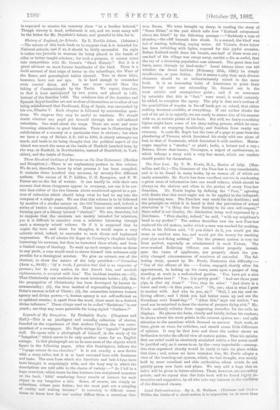The Poor Law. By T. W. Fowle, M.A., Rector of
Islip. (Mac. millan and Co.)—The literature of the Poor-law is very considerable, and is to be found in many books, by no means all of which are easily accessible. Mr. Fowls has done excellent service in condensing a great mass of information into one small volume, which should be always on the shelves and often in the pocket of every Poor-law Guardian. Mr. Fowle begins by defining the " Poor, " agreeing with Burke that this word ought not to be applied to the independ- ent labouring man. The Poor-law was made for the destitute; and the principle on which it is based is that the prevention of actual starvation is "a thing due from Society to its own self-respect." State relief is not charity, the distinction being well expressed by a Dutchman. "Free charity, indeed," he said, "with my neighbour's band in my pocket !" The author describes how the new Poor-laW, replaced the old system, under which a man was mocked for working, when, as his fellows said, "If you didn't do it, you would get the same as another man has, and would get the money for smoking your pipe and doing nothing." Yet the present system is very far from perfect, especially as administered in most Unions. The over-worked Relieving Officers can neither properly investi• gate the cases of applicants, nor properly check the pos. sibly changed circumstances of receivers of out-relief. The fol- lowing story, quoted by Mr. Fowl°, illustrates this difficulty • "One of the officers of the — Union, engaged, shortly after his appointment, in looking up his cases, came upon a pauper of long standing at work in a well-stocked garden. 'You have got a nice bit of garden here?' ' Yes ; it is pretty good." And are those your pigs, in that sty there 7" Yes; they be mine." And there is a horse and cart,—is that yours, too ?' Oh, yes; that is what I goes to market with. And who be you, sir?' ' Well, I am the new re- lieving officer; and I think you had better come up and see the Guardians next Board-day.'" "After this," says our author, "we need not be surprised to hear the stories of paupers dying rich." Mr. Fowls modestly refrains from suggesting remedies for the evils he displays. He places the facts, clearly and briefly, before his readers; he shows where the weak points in the present system are : and calls attention to the questions which demand an answer. Such work, so done, gives no room for criticism, and should cause little difference of opinion. It may be that here and there the author shows an inclination to take the official view of certain points. Thus his opinion that out-relief could ho absolutely abolished within a few years could be justified only, as it seems to us, by the—very improbable—assump- tion that organised charity would be ready to take its place within that time ; and, unless we have mistaken him, Mr. Fowle adopts a view of the boarding-out system, which, we had thought, was mainly held by some excellent and able authorities, whose minds do not quickly grasp new facts and plans. We may add a hope that an index will be giveu in future editions. These, however, are secondary points ; and we repeat that this little book will be found highly in- structive and snggestivo, by all who take any interest in the condition of the distressed clauses.


































 Previous page
Previous page